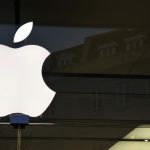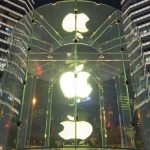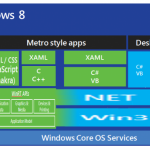What Windows 8 means to Microsoft and to you

The headline really should be "What Windows 8 and Windows on ARM mean to Microsoft and to you" but that didn't ring right to my ears. But it more aptly describes the train of this analysis.
Simply stated: Windows 8 is the riskiest release ever. Microsoft execs say they are "re-imagining" Windows. Believe them. But it's much more: Reinvention. If successful, Microsoft will be a very different company in five years, and that's as much about the future stock price and company valuation as market position and products. All depends on the risks delivering rewards.
Apple protesters make me really mad

About four months ago, thousands of people held vigil outside Apple stores, honoring deceased cofounder Steve Jobs and joining a sudden canonization -- deification, really -- process that raised him above mere mortals. Today, crowds return to those same shops in anger, protesting workers' treatment at Apple factories in China. Whoa, how brands, and emotions about them, suddenly change.
I'm simply appalled, not by Apple, but by the protesters. This is no Arab Spring, people.
All you need is a good idea and a little Kickstarter

As a software developer I can appreciate how important it is to have good ideas. The challenge is making them reality. Also it is not enough just to be taught a skill, one needs to be able to put it to work doing something valuable to others. Some of the best ideas come from people who aren't just trying to make a buck, but who love what they are doing and see the real value in it.
Sadly many a good idea never makes it beyond the drawing board. But some people don't give up so easily and with a little Kickstarter amazing things can happen. Recently, I discovered two unique examples of very good ideas turned into reality by taking advantage of this unique website.
Screw you, too, AT&T

Long-time iPhone users, take note. If you have unlimited data, you want to read this: the company will throttle you for more than 2GB of usage in any given month. Do you feel better now about the thousands you've handed over to AT&T for the past several years?
Users are alerted to the throttling via text message. "Your data usage is among the top 5 percent of users. Data speeds for the rest of your bill cycle may be reduced", it reads.
We need new privacy policies for a new world

In a major update to its privacy policy and the addition of "Search Plus Your World", Google has managed to attain the consensus from the tech-enthused world that it is way beyond the innocent baby days of "don’t be evil". Matt Honan of Gizmodo signalled the privacy shift as the end of Google’s "don’t be evil" promise, which the company built its business on, and Sarah Lacy of Pando Daily shared similar sentiments, though hers was related to the Search Plus Your World outcry.
In a nutshell, one of the biggest sore points that people are having with Google’s new privacy policy is the fact that it permits the search giant to utilize your basic profile information and extend it across your identities when using your other Google services. These changes aren't so much evil, but adaptation to our merging online and offline identities.
Will you pay for Facebook?

Are you ready to pay for Facebook? You just may. Analyst Foad Fadaghi of Telsyte, an Australian technology research firm, tells news.com.au that premium accounts are an option to increase revenues.
As I argued on Wednesday, Facebook now must answer to shareholders. Being a public company is a completely different world from life as a private company. Fadaghi also expects Facebook to make advertising more invasive, as investors demand better performance. Ain't that grand?
Microsoft reinvents Office for the post-PC era

Not since Office 2003 has Microsoft taken such an "ambitious undertaking" to reinvent the productivity suite. Today, PJ Hough, CVP of development for Microsoft's Office division, announced the "technical preview" for the suite's next version and then rudely announced it's "already full". Oh yeah? Why the frak tell us about it then?
It's that ambitious undertaking thing: "First time ever, we will simultaneously update our cloud services, servers, and mobile and PC clients for Office, Office 365, Exchange, SharePoint, Lync, Project and Visio", Hough claims. There's more to that boast than marketing. Microsoft is prepping Office for the cloud-connected, post-PC era. Suddenly Office 15 is going to be a big release.
We must blame Apple for China

Charles Duhigg and David Barboza’s recent New York Times article, "iEconomy: Human Costs Are Built Into an iPad", has created quite a firestorm. The article is a blistering expose of Apple and its Chinese manufacturing partners. For those that haven’t read it, please do. This is important, necessary journalism.
Apple apologists are quick to defend the company's behavior as "Me too". Critics call for boycotting Apple products. Holding Apple accountable is the right thing to do for all tech companies. We must see the apologist arguments for what they are -- fallacies that disempower us from action -- and hold up Apple as standard-bearer reformer for all Western technology manufacturing in China.
Apple, the enterprise, and the marginalization of the cultists

For a company left for dead a little over a decade ago, Apple's return to relevancy and in some cases supremacy is stunning. Love or hate the company, few others have accomplished a similar feat. Now one of the last dominoes left to fall -- the enterprise sector -- is set to embrace the platform.
Forrester Research finds that one out of every five IT employees use one or more Apple products at work. This is not completely by their own request: half of all corporations of 1,000 employees or more now issue Macs to at least some of their work force, with an average of a 52 percent increase in deployments slated for 2012.
I've redone the Windows 8 architecture slide (so you won't have to)

Mary-Jo Foley's article about a slide shown at last year's Microsoft BUILD conference raises uncertainties that bug me as a developer. It's the graphic that attempts to lay out the architecture of Windows 8, particularly in relation to Metro versus the Desktop. As a long-time Windows API programmer, I regard this graphic as the most important yet about Windows 8. Something doesn't seem right!
Somehow all the different interpretations of this chart don't make sense to me. Something's not right, especially the position the Win32 API is given. So I decided to do some digging to see if I could uncover what is really going on under the hood.
Compact software development is IN, bloat is OUT!

For years I have discussed with others about how software development should get back to basics, using native code (rather than scripting languages) by using compilers optimized for creating fast and compact applications.
A recent TIOBE index reemphasizes this point.
Apple's iBooks Author EULA is more and less evil than you think

There's a strange concept in marketing that no publicity is really bad. If people talk about you, it broadly raises brand awareness. People eventually forget the bad news but not the brand. Who remembers last year's furor over Apple's onerous publisher subscription terms? That's the eventual outcome from Apple's iBooks Author end-user license agreement, which has shocked many. Simply stated: If you publish ebooks using iBooks Author, no other publisher but Apple can profit. Distribution anywhere else must be for free. The Internet is outraged, even Apple apologists.
For all the negative outpouring -- and there is plenty -- Apple's EULA isn't as outrageous as critics claim -- it's more and less. The licensing agreement enforces Apple proprietary e-publishing file formats. On the less side, Apple's approach isn't far removed from what print publishers do today, and US copyright law likely supersedes Apple's EULA (but not necessarily any separate agreement).
Mr. University President, please don't adopt Apple's iBooks 2 platform

I'm a second year doctoral student, and I've got some concern about something I heard today that I want to share with any forward-thinking university president, but also with you.
Many schools will be looking at a new e-textbook platform from Apple that will have long-lasting impact on curriculum, students, teaching and cost of education.
10 years after Bill Gates' Trustworthy Computing memo: What it meant for Microsoft and why every tech company needs one

I joined the Microsoft Security Response Center (MSRC) in April 2001 and left the company in December 2010. During that time I was involved in security and privacy at Microsoft, culminating in my role handling worldwide crisis communications for security and privacy incidents. I am one of a handful of people who knows what the security world was like at Microsoft before Chairman Bill Gates' Trustworthy Computing memo on Jan. 15, 2002. I was also part of the growth and transformation that memo brought about over the years.
As Microsoft marks the tenth year anniversary of that memo, it seems a good time to share a former insider’s view of what it really meant and accomplished. As well, I'll share thoughts on why, in the next 10 years, it’s critical that other technology companies follow Gates’ lead.
Tim Cook takes iPhone where Steve Jobs couldn't

In one Samsung iPhone-mocking "Next Big Thing" commercial, an Apple fan laments: "If it looks the same, how will people know I upgraded?" Maybe that's the point of iPhone 4S -- people aren't suppose to know whether you have the new or older model. If that's the intention, and not some dumb-luck circumstance, then Apple CEO Tim Cook deserves high praise for brilliant, strategic execution. Rather than fraking up by not releasing iPhone 5 last year, Apple may have in iPhone 4S achieved a marketing milestone worthy of industry recognition -- or at least some PhD candidate's dissertation.
It's like this: Analyst data from several sources released this week shows surprising iPhone uptake, whether actual sales or simple consumer intentions to buy. The most compelling comes from NPD, which October/November US retail sales figures are nothing short of shocking. Year over year, Android smartphone OS sales share rose to 60 percent from 45 percent in third quarter 2011. During the same time frame, iOS went from 23 percent to 29 percent sales share. Both operating systems had dipped and rose during that year. But in just two months, October to November, Android fell share from 60 percent to 47 percent, while iOS rose from 29 percent to 43 percent. I see Apple's iPhone 4S strategy, not the new smartphone's actual sales, as the reason.
Recent Headlines
Most Commented Stories
BetaNews, your source for breaking tech news, reviews, and in-depth reporting since 1998.
© 1998-2025 BetaNews, Inc. All Rights Reserved. About Us - Privacy Policy - Cookie Policy - Sitemap.